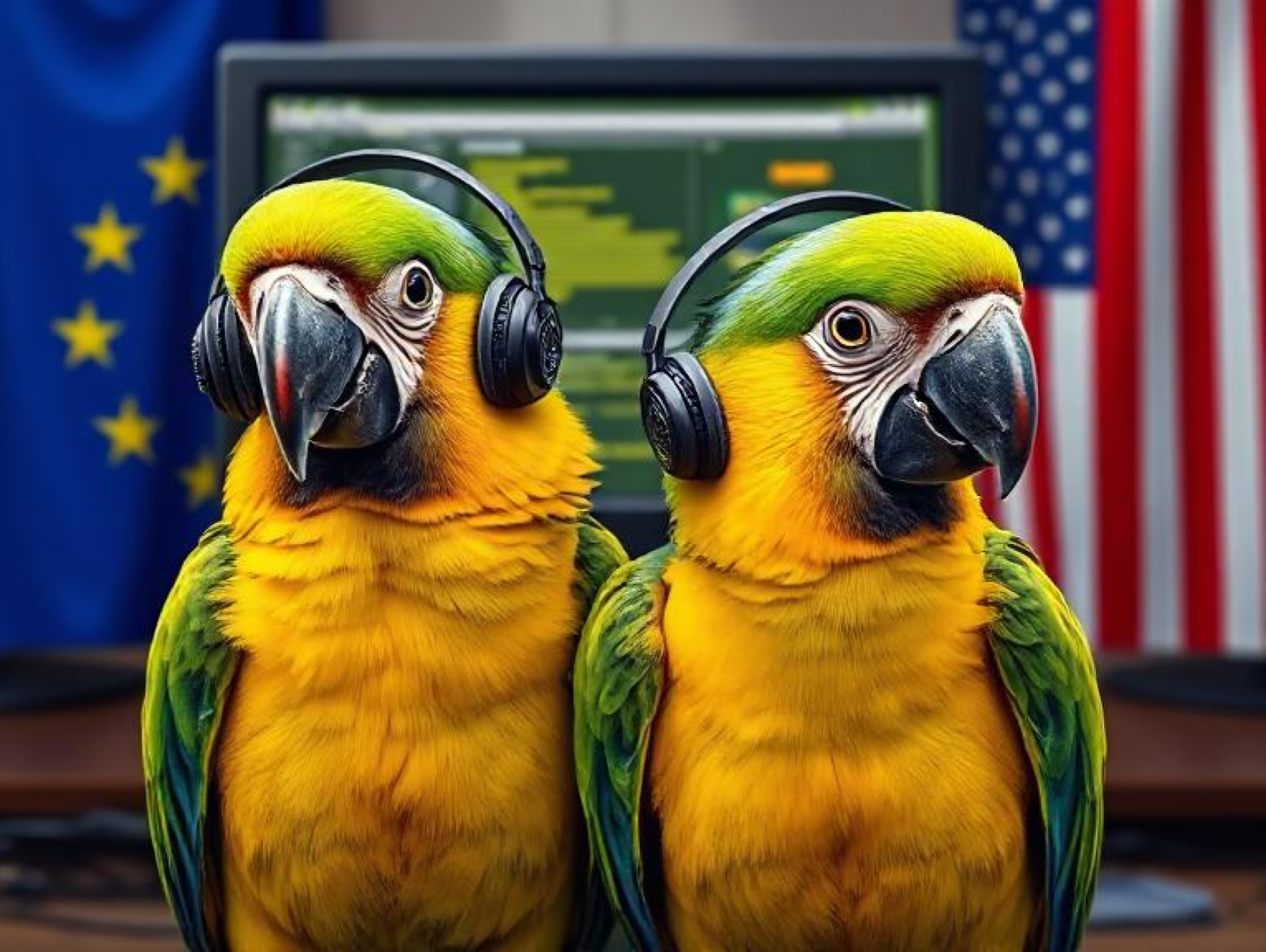AI Transformation
Will the EU AI Act Influence Legislation in the US?
The EU AI Act, the world’s first comprehensive AI regulation, impacts businesses globally. US-based companies providing AI-generated audio ads, voice cloning, and TTS to European clients must comply to maintain market access.

Timo Kunz, Co-founder & CEO
27. Februar 2025

The EU AI Act is the world’s first comprehensive AI regulation, setting a precedent for global AI regulations. While it directly applies to businesses operating in the European Union, its impact extends beyond EU borders. Many US-based companies offering AI-generated audio ads, radio spots generation, voice cloning and text-to-speech (TTS) solutions to European clients must ensure AI Act compliance to maintain market access.
Regulators in the US are closely monitoring the EU AI Act as they develop their own frameworks for AI risk management. While the US has taken a more sector-specific approach to AI governance, the growing focus on trustworthy AI and transparency—particularly in advertising and media—suggests that elements of EU AI regulations could influence future US policies.
For companies operating globally, the trend toward regulatory alignment means that adapting to EU AI compliance standards today could provide a competitive advantage in navigating future international frameworks.
"The EU AI Act represents a groundbreaking piece of legislation poised to reshape AI governance on a global scale. While primarily designed for the European market, its ripple effects will be felt worldwide, particularly impacting US-based companies that provide AI-generated audio, voice cloning, and text-to-speech solutions to European customers. Compliance with these regulations will go beyond mere legal obligation, evolving into a strategic advantage in an era that increasingly values transparency and ethical AI practices. As US regulators watch and craft their own frameworks, early alignment with EU standards could catapult companies to the forefront of compliance in a rapidly evolving regulatory landscape." - Cliff Fluet, Head of Media & Entertainment at Lewis Silkin, and Managing Director of Eleven Advisory
What It Means for the Audio Industry
AI is transforming audio — whether through AI-generated audio ads, synthetic voices, or automated news moderation. But with innovation comes regulation. The EU AI Act, which partially came into force in February 2025, sets clear rules for the use of artificial intelligence, using a risk-based framework to ensure responsible use.
For the audio industry, this raises pressing questions: Do AI-generated spots need to be labeled? Can a radio station use AI-generated news without human oversight? What obligations will audio businesses face next year?
AI in Audio: Balancing Innovation and Compliance
One of the most common concerns is whether AI-generated audio spots require labelling. The EU AI Act requires transparency for realistic, deepfake-style voice cloning, but for standard AI-generated ads with no misleading intent, explicit labelling isn't strictly required - though best practices recommend it.
Risk classification plays a key role in defining the regulatory requirements that AI systems must meet. The AI Act distinguishes between:
Unacceptable risk – Fully prohibited (e.g., deceptive AI used for manipulation or social scoring).
High risk – Strictly regulated (e.g., AI in hiring or legal contexts).
Limited risk – Requires transparency (e.g., AI-generated ads, chatbots).
Minimal risk – No restrictions (e.g., AI-assisted audio editing, spell-checking).
For radio stations, one major takeaway is that AI-generated news moderation must include human oversight to avoid misinformation. AI-assisted music hosting, on the other hand, faces fewer restrictions, though transparency is still key.
What’s Next for Global Businesses?
Companies should start preparing now. Key areas to focus on include:
Understanding AI compliance – The AI Act introduces new transparency and accountability requirements, particularly for AI-generated content. Companies will need to assess whether their use of AI falls under these new regulations.
Evaluating AI in content and advertising – AI-generated voices, dynamic ads, and automated programming may require clear labelling or oversight to comply with EU regulations.
Training and expertise – Employees working with AI must be trained on its ethical and regulatory implications to ensure compliance and responsible use.
Seeking expert guidance – As AI regulations evolve, businesses need a clear strategy for compliance.
"The EU AI Act is setting a new global benchmark for AI regulation, and its impact extends far beyond Europe. Companies worldwide—especially those using AI-generated audio ads, voice cloning, and text-to-speech—will need to adapt to stricter transparency and compliance requirements. As AI regulations evolve, we’re likely to see greater alignment between regions, pushing businesses to develop responsible and trustworthy AI strategies that meet both European and international standards." – Katharina Zeschke, Certified AI Officer and AI-powered Audio Expert.
For a deeper dive into how AI is reshaping the audio industry while navigating regulatory challenges, check out our whitepaper Getting AI transformation right: A 2025 guide for media and creative sectors.
Download NowIf you have further questions about the AI Act or need training on its implications, please feel free to contact us.
Other Articles
About AudioStack
AudioStack is the world's leading end-to-end enterprise solution for AI audio production. Our proprietary technology connects AI-powered media creation forms such as AI script generation, text-to-speech, speech-to-speech, generative music, and dynamic versioning. AudioStack unlocks cost and time-efficient audio that is addressable at scale, without compromising on quality.



